- Home
- Richard Matheson
The Gun Fight Page 11
The Gun Fight Read online
Page 11
At the gate which led to the Coleses’ house, Miss Winston paused not a jot but unlatched, shoved, stepped in, and slammed behind. Beneath her marching heels, the gravel crunched and flinched aside, the porch steps echoed with a wooden hollowness, the welcome mat was crushed. Miss Agatha Winston grasped the heavy knocker and hurled it against the thick-paneled door, then stood stiffly in the almost twilight air, waiting for acknowledgment.
A moment passed. Then, inside, a labored trudging of footsteps sounded. The door was drawn open slowly and the care- and time-worn face of Mrs. Coles appeared.
“Miss Winston,” she said, her tone caught between polite surprise and apprehension.
“Good afternoon,” Miss Winston announced. “Is Mister Coles at home?”
“Why . . . no, he’s still at his shop.”
Grayish lips pursed irritably. “Is your older son at home?” Miss Winston asked.
“Why, no, Robby is at his father’s shop too,” said Mrs. Coles.
“Do you expect them home soon?”
Jane Coles swallowed gingerly. “Why . . . yes, they should be home . . . very soon.”
“I see. I’d like to wait if you don’t mind,” said Miss Agatha Winston.
“Oh.” Mrs. Coles smiled faintly. “Of course,” she said and then, after a moment’s hesitation, stepped aside. “Won’t you . . . come in, Miss Winston?”
“Thank you.” The black-garbed woman entered and stopped in the center of the hallway rug.
“Won’t you . . . come into the sitting room?” Jane Coles invited. “They’ll be home soon now.”
Miss Winston nodded once and walked into the sitting room followed by Mrs. Coles, who walked on the rug as if it were a carpet of eggs.
“Please,” said Jane Coles in her nearly inaudible voice, “sit down, Miss Winston.”
Miss Winston, with one slowly modulated dip, settled down on the couch edge and, drawing her umbrella to the tip of her black shoes, leaned her hands upon the handle.
Mrs. Coles stood near the hall door, a smile faltering on her lips. She knew exactly what Miss Winston was there for but she could not, for a moment, speak of it. As a result, she stood quietly, a sick churning in her stomach as she tried to smile at the forbidding face of the other woman.
“Would you . . . care for a cup of tea?” she asked, suddenly, embarrassed by the silence.
“No, thank you,” said Miss Winston.
Mrs. Coles stood there, looking awkward.
“Please,” Miss Winston said, finally, “don’t feel obligated. If you have work to do, please do it. I’ll be perfectly all right here.”
“Oh.” A pleasant smile strained for a moment on the pale-rose features of Matthew Coles’ defeated wife. “All right.” She swallowed. “They . . . should be home very soon,” she assured.
“Yes,” said Miss Winston. “Thank you. I’ll just wait here.”
“All right.” Mrs. Coles backed off, smiling, her insides tied in great knots of dreading. “I’ll . . . get back to my . . . my work then,” she said. Another smile, another almost imperceptible movement of her throat. “If you . . . want anything,” she said, “I’ll . . . I’ll be in the kitchen.”
Miss Winston nodded, not having smiled once since she came to the door. She watched the small woman turn and fade out of the room and heard the weary trudge of Mrs. Coles’ feet moving down the hall and then the swinging open and shutting of the kitchen door.
She still sat rigidly as before in the silence of the room, her eyes straight ahead, focused only on the resolution of her inner thoughts.
In the hall, the brass-plated pendulum swung in slow, measured arcs and the ticking of the clock tapped metallically at the air. Miss Winston shifted a trifle on the edge of the horse hair couch, her nostrils dilating slightly with an indrawn breath. Her eyes focused a moment on the room and she saw, across from her, a gold-framed family photograph hanging on the wall.
There was Matthew Coles, dominating his family in light and shadow as in actuality—standing, dark-suited, face a Caesar-like cast, the hand he held on the shoulder of his seated wife appearing less as an encouragement of love than as a force pinning her down.
Mrs. Coles sat in stolid patience, on her emotionless face only hints of the charm and beauty that had once been hers. Next to her sat the gangly, freckle-spotted Jimmy Coles, his discomfort at being stuffed into low-neck clothes clearly visible.
And, behind him, stood Robby, his face sober and youthfully good-looking, both hands resting on the back of his younger brother’s chair.
Miss Winston’s eyes shifted up again to the imperious challenge of Matthew Coles’ face. Fine looking man, she thought, fine; decent. Her throat moved and she made haste to ignore the rising flutter of something unwanted by her virginal system. She drew in a tense breath and stared into her thoughts again, stirring up the mud-thick waters of righ teous anger.
She was still sitting like that when the two horses came clopping up the alleyway, when the back door opened and shut and the commanding voice of Matthew Coles sounded in the house.
Quiet talking in the kitchen. Then, footsteps. Miss Winston looked up as Mr. Coles crossed the room, hand extended.
“Miss Winston,” he said gravely and they shook cold hands. Behind, in the hallway, Robby lingered hesitantly.
“Good afternoon, Mister Coles,” Agatha Winston said. Their hands parted.
“Mrs. Coles said that you wish to speak to me.”
“To you and your son,” Miss Winston amended.
Mr. Coles looked into the coal-dark eyes of Miss Agatha Winston and saw a message of rock-like determination there. Then he turned quickly and, without a word, motioned in his son.
Robby entered restively, trying to smile at Miss Winston but failing. He knew why she was there and the thought terrified him.
“Good afternoon . . . Miss Winston,” he said, his voice cracking.
She nodded once, recognizing his presence.
“May we sit?” Mr. Coles asked and Miss Winston gestured with one hand. “Please,” she said.
Matthew Coles and his son sat down.
“Now,” said Mr. Coles, “I believe I know why you’re here.”
“I’m glad,” Miss Winston said, with one curt nod. “I’m glad someone in this town recognizes the gravity of this ugly situation.” She was thinking with particular deprecation of the Reverend Omar Bond.
“We have recognized it, Miss Winston,” Matthew Coles assured her. “Believe me, ma’m.”
Robby sat on the chair, feeling numb, a cold and ceaseless sinking in his stomach. No, he thought. No. It was all he could think. No. No.
“Then I think it’s time a course of action was settled upon,” said Miss Winston. “This cannot be allowed to go on any further.”
“I agree with you,” said Matthew Coles. “I agree with you entirely.” He nodded grimly, thinking that here was a woman who spoke his language, who thought as a woman should think—with clarity, with decision.
“Well, then . . .” said Miss Winston.
“My son, Robert,” said Mr. Coles, “realizing that it is his responsibility as your niece’s intended husband, has agreed to defend her honor.”
Miss Winston nodded in agreement.
“And,” Matthew Coles went on, “to use force against Benton unless a complete and public apology is made.”
Robby bit his lip. “But, I—” he started, too weakly to be heard. He leaned forward, the blood pounding in his head. He hadn’t agreed to anything like that. He watched the two of them with sick eyes as they planned the use of his life.
“Apology?” said Miss Winston with a coldly withdrawn tone.
“Well,” Mr. Coles explained, “I am not a man to shirk the truth, ma’m. But neither am I a man to advocate violence unless it is absolutely necessary. Mister Benton was in my shop today disclaiming any responsibility in this matter.”
Miss Winston looked shocked. “But you didn’t believe him?” she said, tensely.
“Naturally not,” Matthew Coles assured her. “However . . . we must allow for all possibilities other than violence, ma’m. I believe John Benton to be guilty as charged. But, if he is willing, before the public eye, to confess his guilt and repent, I . . . see no reason why violence should not be avoided.”
Matthew Coles leaned back, thinking himself a quite reasonable and impartial man.
“But if he said he didn’t do it,” Robby suddenly broke in, “he’s not going to apologize!” His voice was nervously excited as he spoke. His hands were cold and shaking in his lap.
“Sir,” Matthew Coles declared firmly, offended at this outburst as reflecting on his parenthood, “the conditions as stated are unchangeable. Either Benton admits his guilt and repents . . . or violence must, unavoidably, be used upon him.”
Robby felt himself shake as a wave of nausea swept over him. I’m not going to die!—the anguished thought cut through his brain—I’m not!
“One moment,” Miss Winston started heatedly, “all this talk of admission and, and of apology is no longer reasonable. This afternoon I took my niece home in a near-hysterical state. She will be compelled to remain there until this terrible thing is settled. Not by her mother, not by me but by gossip! She’s been driven from the streets by scorn!”
Matthew Coles looked indignant and shocked.
“In my shop this very afternoon,” Miss Winston went on, furiously, “a customer—I won’t mention her name—asked me—bold as you please!—if it were true that Louisa was—” she swallowed reticence, withdrawal, ingrained shame of all things physical, “—was with child!” she finished, her voice a whisper of passionate outrage.
Matthew Coles stiffened as though someone had struck him violently across the face. Robby looked suddenly blank.
There was shocked silence a moment, then the low, teeth-clenched voice of Matthew Coles rolling out slowly.
“Naturally,” he said, “this puts an entirely new aspect on the situation.”
“But . . . but Louisa never said that—” Robby started.
“It no longer matters what Louisa said!” Agatha Winston cried out vehemently. “What matters is that her reputation and the reputation of our entire family is being dragged through the mud!”
Robby flinched at her angry words and stared at Miss Winston speechlessly.
“Unless you stand up for my niece, she’ll never be able to lift her head in Kellville again! She will be shamed, her mother will be shamed, and I’ll be shamed!” Miss Winston’s voice broke and she began sobbing dryly, hoarsely.
“My dear Miss Winston,” Matthew Coles said quickly, jumping up from his chair, a fiercely accusing glare thrown at his son.
Miss Winston fought for control, hastily and ashamedly brushing away the hot tears that sprang from her eyes.
“We’re shamed, shamed!” she sobbed miserably.
From where he sat, motionless and numb, Robby could see the whitened pulsing at his father’s jaw, the tense set of his mouth. He looked down at the weeping Miss Winston for a moment. Then, before his father could say a word or look toward him, Robby stood with one wooden motion. He couldn’t feel his hands or his feet, only the blood pounding so hard at his temples that he thought his veins would burst and spatter blood across his face.
He didn’t know if it was courage or cold, drained terror. But his mind suddenly recognized the situation in all its clarity—Louisa driven into hiding, the town leering at her, picking at her reputation with insulting fingers.
“Don’t cry, Miss Winston,” he heard a strange, unnatural voice say in his throat.
Miss Agatha Winston looked up at the grim-faced young man and it seemed for a moment to Robby as if both she and his father were old and helpless and that it was up to him alone to settle the matter.
“Louisa will be defended,” he heard the words go on as though he stood apart, listening. “Her honor will be defended. I’ll stand up for her.”
“When?” his father asked and it seemed a perfectly reasonable question in that moment, a question spoken from necessity.
“Tomorrow,” Robby said. “Tomorrow I will.”
His brain seemed to be hanging in a great, icy emptiness, like some crystalline machine suspended in a winter’s night, bodiless—clicking and moving of itself, divorced from all fear and trepidation. There was a responsibility to be assumed, nothing else mattered. Manhood required it and he must live or fall by the demand. Tomorrow he would fight John Benton in the only way it could be done.
Robby Coles knew his father was shaking his hand strongly but he didn’t feel it and he hardly saw it.
Chapter Seventeen
“No, sir,” John Benton said over the supper table that night, “I admit I’m still a tenderfoot when it comes to cattle ranchin’ but one thing I do know; you’re not goin’ to get as strong a cow horse lettin’ ’em graze. Feed ’em grain; they earn it. They’re a lot better workers for it.”
Lew Goodwill shrugged his thick shoulders. “Well, I guess that’s up to you, boss,” he said. “Most outfits I rode with, though, let their hosses graze.”
Benton took a drink of his hot coffee, then put down the cup. “No, grain makes harder muscles,” he said. “Gives ’em more endurance, I know that for a fact.”
Julia brought more biscuits to the table and sat back down to her supper without a word. She probed listlessly at her meat, the fork held apathetically in her fingers.
Benton noticed how she toyed with her food and reached across the broad table to put his hand on hers. She looked up with a faint smile.
“Honey, stop worryin’,” he told her. “Nothin’s goin’ to happen.”
Her smile was unconvincing. “I hope so,” she said.
Merv Linken made a wry face as he chewed his beef. “Ma’m, you ain’t got nothin’ to fret about. Robby Coles ain’t bucklin’ on no iron against yore husband.” He made a mildly scoffing sound. “That’d be like tryin’ t’scratch his ear with his elbow.”
Julia tried to appear reassured but was unable to manage it.
“Saw the Reverend ridin’ out o’ here, this mawnin’,” Lew Goodwill said, looking up from his food. “What’d he want?”
Benton always wanted his men to feel as if they were part of the family and, as a result, there were few secrets among them.
“Yeah, what’d that ol’ sin-buster want, anyway?” Merv asked, his leathery face deadpan, his light blue eyes fixed on Julia.
“Merv, you stop that,” Julia scolded and the deadpan changed to cheerful grinning. Julia tried not to smile back but couldn’t keep from it.
“You’re a terrible man, Merv Linken,” she said, the corners of her mouth forcing down the smile. “There’s no hope for you.”
“He came out to say I should ride into town and clear it all up,” Benton told Lew Goodwill when his wife had finished. “You know the rest.”
Lew shook his heavy head. “Darndest thing,” he said, “makin’ such a fuss over nothin’.”
“It’s something to them,” Benton said. “They’re usin’ both barrels on me.”
“Well . . .” Julia looked worried again. “Well, shouldn’t we go in and try to settle it then? We could have the Reverend get everyone together in his house and . . .” She hesitated. “. . . well, clear it up,” she finished.
“Honey, I told ya the way they all acted,” John told her. “They just about threw me outta town. Even the barber’s spreadin’ lies about me.” He exhaled disgustedly. “Then when that kid, that—what’s his name?—O’Hara tried to fill his hand on me . . .” He shook his head grimly. “I’ve had enough, Julia. I’ll just stay out here on the ranch and let ’em all stew in their own juice till they cook themselves.”
“But, what if Robby comes after you?”
“Ma.” John looked patiently at his wife. “Can you feature that? Can you feature that little feller puttin’ on a gun and comin’ after me?”
Julia looked down at her plate. “You know what his father is like,�
� she said, quietly. “You know what Mr. Coles said.”
“He was riled,” Benton said, grinning. “I called him an old man and that bristled him.” The two other men chuckled. “No, Coles isn’t goin’ to push his own boy into the grave,” Benton finished.
“I . . . suppose.”
Julia still played with her supper, finally putting down the fork altogether and drinking some coffee. Then she got up and brought an apple pie to the table and cut thick slices of it for the three men.
While she cleaned the supper scraps onto the hound dog’s plate, she heard the three men talking about bits. None of them sounded concerned, least of all her husband. And Benton wasn’t the type of man who hid his worries very effectively.
Julia thought to herself. John was probably right. There was a lot of fuss, yes, but Robby Coles knew John’s reputation and couldn’t possibly consider trying to fight him with a . . .
But what if he did, what if he was forced to? Julia stood by the pump, staring across the kitchen at her husband. What if Robby did come after him?
Julia Benton closed her eyes suddenly and did the only thing she could think of at the moment. She prayed; but it wasn’t out of fear for her husband’s life, it was something else.
Chapter Eighteen
It was dark in the room, silent. Out in the breezeless night, crickets rasped like a thousand files grating on metal. A block away, she heard the muffled trotting of a horse as someone rode home late from town. The hoofbeats faded, disappeared, and the curtain of dark silence settled once again over the street, the house, the room in which she lay, sleep-less, on her bed.
In the back bedroom, in the bed so painfully large for her, her mother dozed fitfully, mumbling and whimpering in her sleep. Her husband had been dead eight years now but Elizabeth Harper still slept in the outsize four-poster, cold, restless, and lonely. She had never been quite the same since the funeral. They had, almost literally, buried her in the cemetery with her husband.

 Earthbound
Earthbound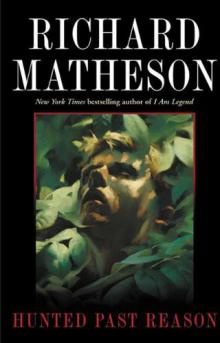 Hunted Past Reason
Hunted Past Reason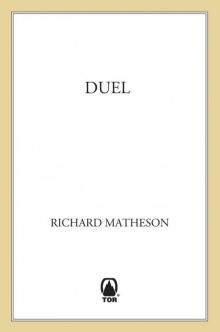 Duel: Terror Stories
Duel: Terror Stories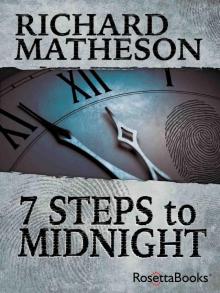 7 Steps to Midnight
7 Steps to Midnight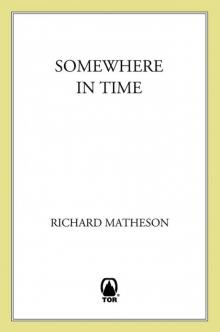 Somewhere in Time
Somewhere in Time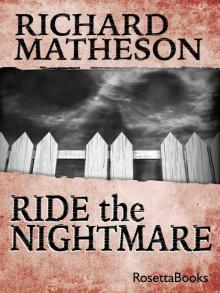 Ride the Nightmare
Ride the Nightmare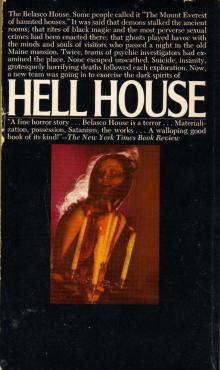 Hell House
Hell House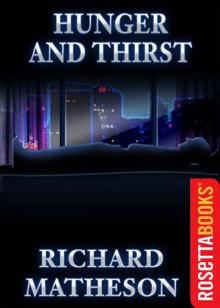 Hunger and Thirst
Hunger and Thirst Lyrics
Lyrics Other Kingdoms
Other Kingdoms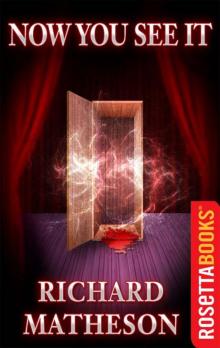 Now You See It . . .
Now You See It . . .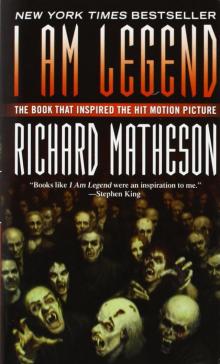 I Am Legend
I Am Legend The Box: Uncanny Stories
The Box: Uncanny Stories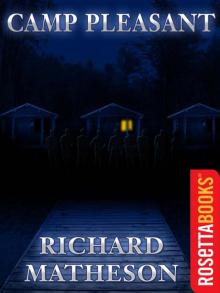 Camp Pleasant
Camp Pleasant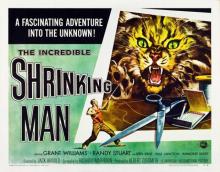 The Incredible Shrinking Man
The Incredible Shrinking Man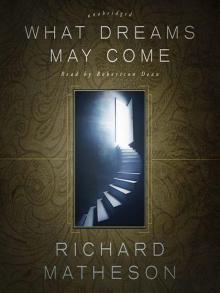 What Dreams May Come
What Dreams May Come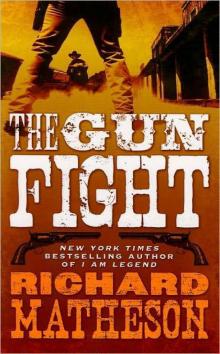 The Gun Fight
The Gun Fight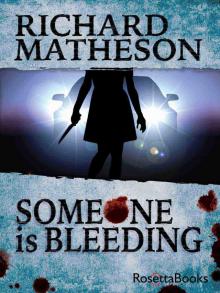 Someone Is Bleeding
Someone Is Bleeding Mediums Rare
Mediums Rare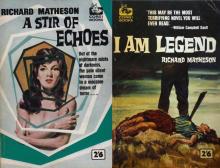 A Stir of Echoes
A Stir of Echoes Backteria and Other Improbable Tales
Backteria and Other Improbable Tales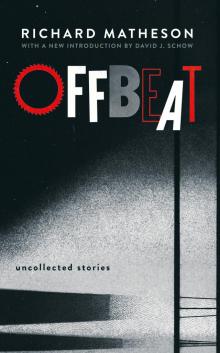 Offbeat: Uncollected Stories
Offbeat: Uncollected Stories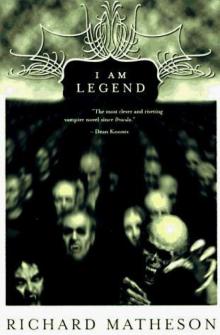 I Am Legend and Other Stories
I Am Legend and Other Stories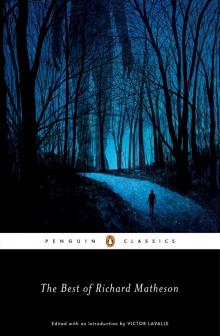 The Best of Richard Matheson
The Best of Richard Matheson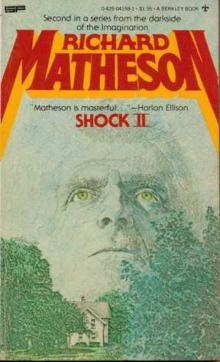 Shock II
Shock II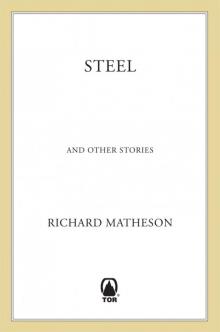 Steel: And Other Stories
Steel: And Other Stories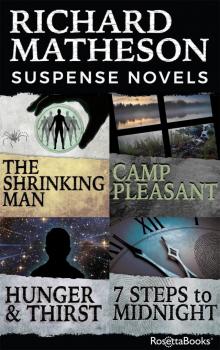 Richard Matheson Suspense Novels
Richard Matheson Suspense Novels The Link
The Link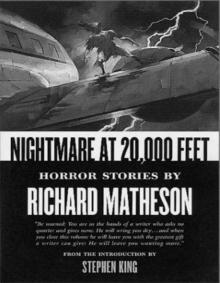 Nightmare At 20,000 Feet
Nightmare At 20,000 Feet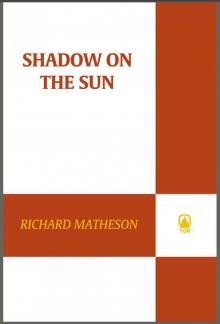 Shadow on the Sun
Shadow on the Sun![Steel and other stories [SSC] Read online](http://i1.bookreadfree.com/i/03/21/steel_and_other_stories_ssc_preview.jpg) Steel and other stories [SSC]
Steel and other stories [SSC] Created By
Created By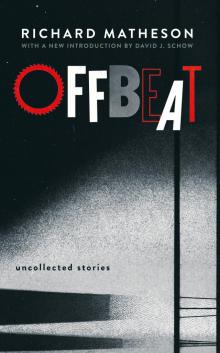 Offbeat
Offbeat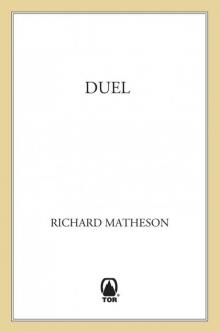 Duel
Duel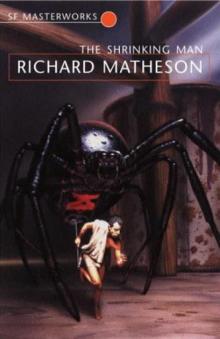 The Shrinking Man
The Shrinking Man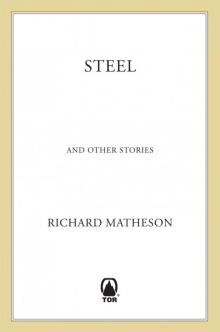 Steel
Steel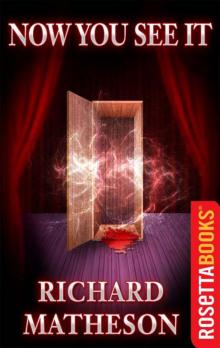 Now You See It
Now You See It